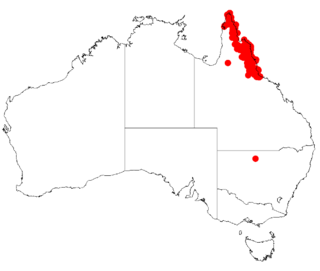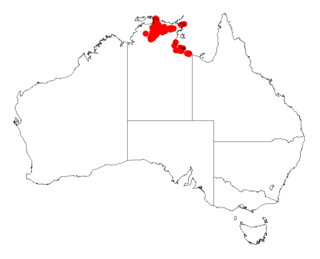
Acacia leptocarpa, commonly known as north coast wattle, is a shrub or small tree native to New Guinea and coastal regions of northern Australia.

Acacia areolata is a shrub belonging to the genus Acacia and the subgenus Juliflorae that is endemic to north western Australia.

Acacia gonocarpa, commonly known as wuluru, is a tree or shrub belonging to the genus Acacia and the subgenus Juliflorae. It is native to northern Australia.

Acacia incurvaneura, also known as narrow-leaf wattle, is a shrub belonging to the genus Acacia and the subgenus Juliflorae that is endemic to central and western Australia.

Acacia oncinocarpa is a shrub or tree belonging to the genus Acacia and the subgenus Juliflorae that is endemic to northern Australia.

Acacia pellita is a shrub or tree belonging to the genus Acacia and the subgenus Juliflorae that is endemic to parts of tropical northern Australia.

Acacia sibirica, commonly known as bastard mulga or false witchetty bush, is a tree or shrub belonging to the genus Acacia and the subgenus Juliflorae. It is native to arid areas of Australia.

Acacia stipuligera is a tree or shrub belonging to the genus Acacia and the subgenus Juliflorae. It is native to arid and tropical parts of northern Australia.

Acacia tenuissima, commonly known as narrow-leaved wattle, broom wattle, minyana, slender mulga or slender wattle, is a shrub belonging to the genus Acacia and the subgenus Juliflorae endemic to temperate and tropical areas of Australia. Indigenous Australians the Kurrama peoples know the plant as Janangungu and the Banyjima know it as Murruthurru.

Acacia thomsonii, commonly known as Thomson's wattle, is a shrub or tree belonging to the genus Acacia and the subgenus Juliflorae that native to parts of northern Australia.

Acacia dictyophleba, also known as the sandhill wattle, waxy wattlefeather veined wattle, and spear tree, is a shrub belonging to the genus Acacia and the subgenus Phyllodineae. The Nyangumarta peoples know the plant as Langkur or Lungkun; the Thalanyji know it as Jabandi; and the Pintupi know it as mulyati.

Acacia galeata is a shrub or tree of the genus Acacia and the subgenus Plurinerves that is endemic to an area of western Australia.

Acacia nuperrima is a shrub of the genus Acacia and the subgenus Plurinerves that is endemic to a large area across northern Australia.

Acacia jucunda, commonly known as yetman wattle, is a shrub or tree belonging to the genus Acacia and the subgenus Phyllodineae that is endemic to north eastern Australia and is considered to be endangered in New South Wales.

Acacia semilunata is a shrub or tree belonging to the genus Acacia and the subgenus Phyllodineae native to north eastern Australia.

Acacia calyculata is a shrub belonging to the genus Acacia and the subgenus Juliflorae that is native to north eastern Australia.

Acacia multistipulosa is a shrub or tree belonging to the genus Acacia and the subgenus Juliflorae that is native to northern Australia.

Acacia torulosa is a shrub or tree belonging to the genus Acacia and the subgenus Juliflorae that is native to north eastern Australia.

Acacia producta is a shrub of the genus Acacia and the subgenus Plurinerves that is endemic to northern central Australia.

Acacia rothii, commonly known as tooroo, Roth's wattle, lancewood and spoon tree, is a shrub of the genus Acacia and the subgenus Plurinerves that is endemic to an area in north eastern Australia.




















